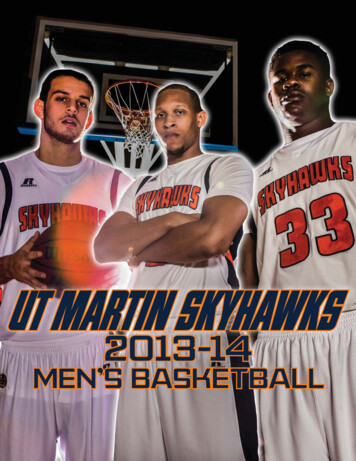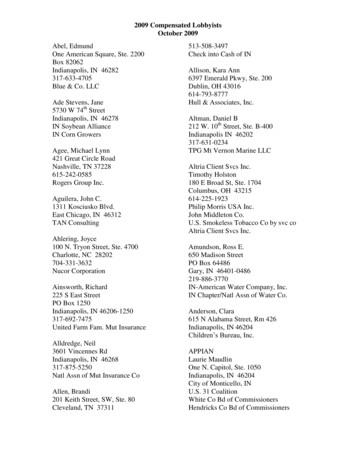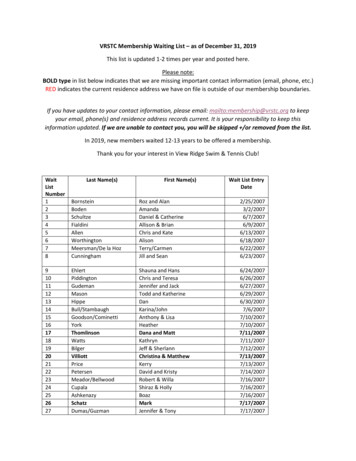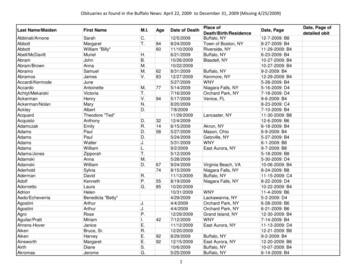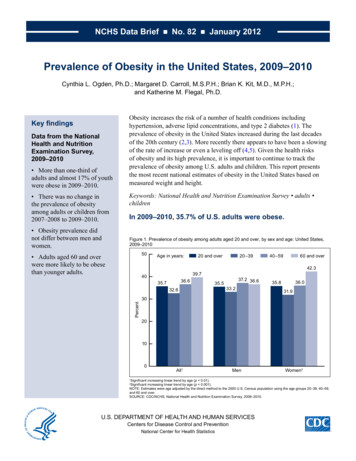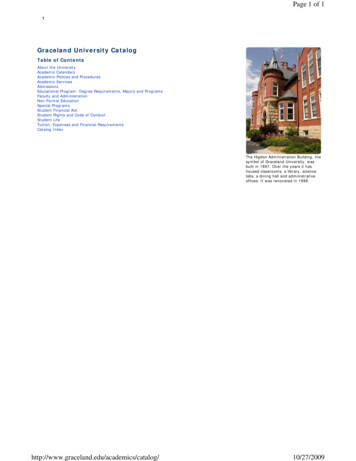
Transcription
Page 1 of 11Graceland University CatalogTable of ContentsAbout the UniversityAcademic CalendarsAcademic Policies and ProceduresAcademic ServicesAdmissionsEducational Program: Degree Requirements, Majors and ProgramsFaculty and AdministrationNon-Formal EducationSpecial ProgramsStudent Financial AidStudent Rights and Code of ConductStudent LifeTuition, Expenses and Financial RequirementsCatalog IndexThe Higdon Administration Building, thesymbol of Graceland University, wasbuilt in 1897. Over the years it hashoused classrooms, a library, sciencelabs, a dining hall and administrativeoffices. It was renovated in /27/2009
Page 1 of 32Table of ContentsAbout the UniversityAccreditationHistoryVision, Mission, ValuesMission StatementGoals of the UniversityPolicy on Non-DiscriminationEducational SitesLamoni CampusIndependence CampusNon-residential ProgramsACCREDITATIONGraceland University is a member of the North Central Association and is accredited by the Higher LearningCommission, www.ncahlc.org, (800) 621-7440.Graceland University's teacher education programs are accredited by the National Council for Accreditation ofTeacher Education (NCATE), www.ncate.org.The nursing programs are accredited by the Commission on Collegiate Nursing Education (CCNE),www.aacn.nche.edu, and are approved by the Missouri State Board of Nursing and the Iowa Board of Nursing.These academic standards ensure that a degree from Graceland University will be recognized by educational,business, and professional communities.This catalog is an official document of Graceland University, and the programs and policies in it have beenapproved by the Board of Trustees or its duly authorized agents.While these programs and policies may be subject to change without notice, the university publishes this catalogwith the intention that students can expect reasonable continuity in academic areas.Changes in other areas — such as cost, campus life, the housing arrangement — occur in an orderly fashion.History of Graceland UniversityGraceland University was founded in 1895 by the Community of Christ church as a “non-sectarian institution ofhigher education [open] to all people.” More than 110 years later, Graceland is still committed to providing a solidliberal arts education to a diverse student population. Today, Graceland students represent 39 states and 37countries and can choose from more than 40 academic majors.Graceland began as a high school academy and four-year college. In 1917, became Iowa’s first accredited juniorcollege. The university’s mission took another decisive turn in the late 1950s by founding a four-year program,graduating its first BA degree in 1958.In 1971, Graceland granted its first baccalaureate degree in nursing. Students in that program spend two yearson the Lamoni campus followed by two years on the university’s Independence, Missouri, campus. In 1987, thecollege launched an Outreach Nursing Program for registered nurses that has evolved into complete online degreeprograms in healthcare and education.Recognizing that not everyone who would like to earn a degree can attend traditional college classes, Graceland’scampus-based studies was established in the late 1990s to create opportunities for baccalaureate degreecompletion programs at two-year institutions. Students can transfer credits from previously attended colleges andcomplete their junior and senior coursework at Graceland by attending classes taught on area community collegecampuses.The university’s first graduate degree program was launched in 1994. The Master of Arts in Religion became thefirst program in the Community of Christ Seminary, which was established in 2002. Currently, students can earn aMaster’s degree in Education, Religion, Christian Studies, or Nursing. The Center for the Study of the Korean War,a unique primary resource library and archive, became a part of the Independence Campus in 2000. The SandageCenter for the Study of Free Enterprise is located on the Lamoni Campus.While many aspects of campus life have changed through its first 110 years, Graceland University has been trueto its commitment to provide a quality liberal arts education that contributes to the growth of the whole student.(table of contents)Vision, Mission, ValuesVisionGraceland University will become a recognized educational leader, inspiring and empowering persons fortransformational service and leadership.MissionGraceland creates learning communities where students develop their potential for meaningful and productivelives.ValuesGraceland values learning, wholeness, and community. Graceland encourages the development of these values /10/27/2009
Page 2 of 33the enrichment of lives and the betterment of the world.LearningWe believe in the life long process of the open and free pursuit of truth.WholenessWe believe that the development of the intellectual, physical, social, and spiritual dimensions of all persons isnecessary for healthy and fulfilling lives.CommunityWe appreciate and welcome diversity and, as an institution sponsored by the Community of Christ, believe in theinherent worth of all persons expressed through relationships built on the foundation of unconditional love andacceptance.(table of contents)Mission of Graceland UniversityGraceland University educates students for advanced study, for productive careers, and for rich lives. Its studentbody is a targeted, yet diverse group that includes persons of different ages, backgrounds, and national originswho share a commitment to learning. Its curriculum, firmly rooted in the liberal arts tradition and enhanced bycareer-oriented practical experiences, affirms different styles of learning and prepares students to becomecompetent professionals. Its highly qualified faculty excel in teaching and engage in scholarly, creative andprofessional activities. Together with the administration and staff, they care deeply about students.Graceland offers a learning environment for the residential as well as the non-residential student that nurturespersonal growth. Its challenging academic program stresses the joy of lifelong learning, the rigor of intellectualdiscipline, and the relationship of both to a satisfying professional and personal life. Its size fosters genuineconcern for the individual while providing fellowship and a sense of belonging. For the residential student, its richco-curricular program of interest groups, athletics, student government, residential life, and leisure activitiesprovides opportunity to develop interpersonal skills, relationships, creativity, and leadership.Based on the Christian values of human dignity, mutual respect, and social responsibility, Graceland welcomespersons of all faiths. It actively supports the counsel of its sponsoring denomination, the Community of Christ, to“learn by study and by faith” and indeed offers tangible expression of the church’s commitment to the open andfree pursuit of knowledge through higher education.Graceland promotes opportunity, justice, and world peace through practical and visionary action.(table of contents)Goals of the UniversityThe people of Graceland Universityhelp students grow towork, care, and enjoy life intelligently.Toward these goals, we help students nurture their abilities tothink, learn, and communicate;develop broad knowledge and sound values;lead and cooperate in building a better world.1.2.3.4.To become knowledgeable in the natural sciences, history/political science, and the social/behavioralsciences.To develop an appreciation of the arts and humanities.To develop foundational skills, including skills of quantitative analysis, oral and written communication,ethical consciousness and sound values, and healthful living.To be knowledgeable and appreciative of human diversity as expressed in cultures other than one’s own.(table of contents)Policy on Non-DiscriminationIt is the policy of Graceland University to extend equal opportunities to all applicants for employment, to allemployees seeking advancement, and to all students applying for enrollment who meet the basic criteriaestablished. It is further the policy of Graceland University not to discriminate against any employee, prospectiveemployee, student, or prospective student, on the basis of race, color, religion, age, sex, national origin, sexualorientation, or disability.Graceland University is committed to the elimination of those conditions and attitudes from which discrimination isspawned and desires to give leadership in solving those problems that impede the broad application of justice andequity in all human relationships. A university with a Christian commission has a mandate to search for and applythese principles of fairness in all aspects of its operation over and above its legal obligation to comply with thetenants of Equal Opportunity requirements.(table of contents)Graceland University Educational SitesGraceland University offers a quality educational program at multiple locations using various course deliverymethods to provide opportunities for many students. Students may take Graceland University courses at thefollowing locations.Lamoni CampusThe home campus, located in Lamoni, Iowa, provides education formany full- and part-time residential students, who seek the Bachelorof Arts, Bachelor of Arts (Honors), Bachelor of Science, Bachelor 10/27/2009
4of Arts, Bachelor of Arts (Honors), Bachelor of Science, Bachelor ofScience (Honors), or Master of Education degrees in 43 differentmajors. Courses are available for non-degree seeking studentsinterested in enrolling for personal enrichment.In addition to degree programs, Graceland University offers coursesfor personal enrichment at the Lamoni and Independence locations,as well as through the Center for Professional Development and LifeLong Learning, Inc., which includes SkillPath Seminars located inOverland Park, Kansas.Independence CampusThe Graceland University Independence Campus located at 1401West Truman Road in Independence, Missouri, provides on campuseducation for students pursuing a Bachelor of Science in Nursing,Bachelor of Arts in Business, Bachelor of Arts in Education, or aMaster of Education degree.The Independence Campus is also home to our online programswhich allow students the flexibility to earn either the RN to B.S.N. orB.A. degree, a Master of Science in Nursing, or a Master of Educationdegree. In addition, a Master of Arts in Christian Ministry and aMaster of Arts in Religion can be earned through combined oncampus and online courses.Graceland University Non-residential ProgramsSeveral off-campus sites share in the extended campus experience,and allow non-traditional students the opportunity to complete theirdegrees or pursue a Master's degree. North Central Missouri Collegein Trenton, Missouri, and Indian Hills Community College inCenterville, Iowa, assist students in completion degrees inundergraduate Elementary Education. Students transfer credits frompreviously attended colleges and complete their junior and seniorcoursework with Graceland by attending classes offered in their area.Undergraduate students benefit from Graceland's articulation and equivalency agreements. The Master ofEducation in Collaborative Learning and Teaching is offered at Grant Wood AEA in Cedar Rapids, Iowa, andGraceland University campus in Independence, Missouri. Off-campus courses are offered evenings and weekends,allowing most students to hold a job, fulfill family and community obligations and still earn a degree.The academic year is most often divided into five nine-week terms, but alternative scheduling may also beavailable. Classes are offered in a variety of formats including: 1) Traditional classes — Classes offered at thecommunity college campus or on the Graceland campus taught by Graceland University faculty and adjunctprofessors; 2) Online classes. Courses may be taken by campus students as part of their normal class load on aspace-available basis.For more information concerning Graceland's non-residential programs, please call 1-800-833-0524 or visit ourwebsite on the Graceland University homepage at www.graceland.edu.(table of g/5213/10/27/2009
Page 1 of 15Fall 2009 Academic CalendarAugustWed. Thurs. 26, 27Faculty Fall ConferenceSat. 29New Students ArriveMon. 31Returning Students ArriveClasses Begin, ICSeptemberTues. 1Classes Begin, LamoniOctoberFri.-Sun. 9-11Homecoming WeekendFri. 16MidtermFri. 16 (5:00 p.m.)Midterm Break BeginsWed. 21 (8:00 a.m.)Classes ResumeNovemberTues. 24 (9:00 p.m.)Thanksgiving Recess BeginsMon. 30 (8:00 a.m.)Classes ResumeDecemberFri. 11Classes EndMon.-Thurs. 14-17Semester ExaminationsIC indicates Independence Campus, including the School of Nursing, when dates differ from Lamoni AcademicCalendar/14825/10/30/2009
Page 1 of 16Spring 2010 Academic CalendarFront entrance of Graceland University.JanuaryMon. 4Winter Term BeginsSat. XXX (tentative)Master of Education Commencement, Cedar RapidsThurs. 21Winter Term EndsMon. 25Classes Begin, Lamoni, ICMarchFri. 12Midterm EvaluationFri. 12 (5:00 p.m.)Spring Recess BeginsMon. 22 (8:00 a.m.)Classes ResumeAprilMon. 5Easter BreakMon. 5 (5:00 p.m.)Classes ResumeMayFri. 7Classes EndMon.-Thurs. 10-13Semester ExaminationsFri. 14Nursing Recognition CeremonySat. 15BaccalaureateSun. 16CommencementMon.-Tues. 17-18Faculty Spring ConferenceIC indicates Independence Campus, including the School of Nursing, when dates differ from Lamoni AcademicCalendar/14826/10/30/2009
Page 1 of 17Summer 2010 Academic CalendarMayThurs. 20Summer Session Begins, LamoniJulyThurs. 1IC Summer session beginsAugustFri. 13IC Summer Session EndsFri. 20Lamoni Summer Sessions EndIC indicates Independence Campus, including the School of Nursing, when dates differ from Lamoni AcademicCalendar/14827/10/30/2009
Page 1 of 18Fall 2010 Academic CalendarAugustWed. Thurs. 25, 26Faculty Fall ConferenceSat. 28New Students ArriveMon. 30Returning Students ArriveClasses Begin, ICTues. 31Classes Begin, LamoniOctoberFri.-Sun. 1-3Homecoming WeekendFri. 15MidtermFri. 15 (5:00 p.m.)Midterm Break BeginsWed. 20 (8:00 a.m.)Classes ResumeNovemberTues. 23 (9:00 p.m.)Thanksgiving Recess BeginsMon. 29 (8:00 a.m.)Classes ResumeDecemberFri. 10Classes EndMon.-Thurs. 13-16Semester ExaminationsIC indicates Independence Campus, including the School of Nursing, when dates differ from Lamoni AcademicCalendar/31024/10/30/2009
Page 1 of 19Spring 2011 Academic CalendarJanuaryMon. 3Winter Term BeginsSat. XXX (tentative)Master of Education Commencement, Cedar RapidsThurs. 20Winter Term EndsMon. 24Classes Begin, Lamoni, ICMarchFri. 11Midterm EvaluationFri. 11 (5:00 p.m.)Spring Recess BeginsMon. 21 (8:00 a.m.)Classes ResumeAprilMon. 25Easter BreakMon. 25 (5:00 p.m.)Classes ResumeMayFri. 6Classes EndMon.-Thurs. 9-12Semester ExaminationsFri. 13Nursing Recognition CeremonySat. 14BaccalaureateSun. 15CommencementMon.-Tues. 16-17Faculty Spring ConferenceIC indicates Independence Campus, including the School of Nursing, when dates differ from Lamoni AcademicCalendar/31043/10/30/2009
Page 1 of 2102009-2010 18 Week Academic CalendarFall 2009AugustMon. 3Classes Begin, 9 Week Fall Subsession AOctoberFri.-Sun. 11-13Homecoming WeekendSat. 3Classes End, 9 Week Fall Subsession AMon. 5Classes Begin, 9 Week Fall Subsession BNovemberTues. 24 (9:00 p.m.)Thanksgiving Recess BeginsMon. 30 (8:00 a.m.)Classes ResumeDecemberSat. 12Classes End, 9 Week Fall Subsession BSpring 2010JanuaryMon. 4Classes Begin, 9 Week Spring Subsession AMarchSat. 6Classes End, 9 Week Spring Subsession AMon. 8Classes Begin, 9 Week Spring Subsession BFri. 12 (5:00 p.m.)Spring Recess BeginsMon. 22 (8:00 a.m.)Classes ResumeMaySat. 15Classes End, 9 Week Spring Subsession BSat. 15BaccalaureateSun. 16CommencementSummer 2010MayMon. 17Classes Begin, 9 Week Summer SessionJulySat. 17Classes End, 9 Week Summer Session2010-2011 18 Week Academic CalendarFall 2010AugustMon. 2Classes Begin, 9 Week Fall Subsession AOctoberFri.-Sun. 1-3Homecoming WeekendSat. 2Classes End, 9 Week Fall Subsession AMon. 4Classes Begin, 9 Week Fall Subsession BNovemberTues. 23 (9:00 p.m.)Thanksgiving Recess BeginsMon. 29 (8:00 a.m.)Classes atalog/AcademicCalendar/3521/10/30/2009
Page 2 of 211Sat. 11Classes End, 9 Week Fall Subsession BSpring 2011JanuaryMon. 3Classes Begin, 9 Week Spring Subsession AMarchSat. 5Classes End, 9 Week Spring Subsession AMon. 7Classes Begin, 9 Week Spring Subsession BFri. 11 (5:00 p.m.)Spring Recess BeginsMon. 21 (8:00 a.m.)Classes ResumeMaySat. 14Classes End, 9 Week Spring Subsession BSat. 14BaccalaureateSun. 15CommencementSummer 2011MayMon. 16Classes Begin, 9 Week Summer SessionJulySat. 16Classes End, 9 Week Summer AcademicCalendar/3521/10/30/2009
Page 1 of 2122009-2010 Trimester Academic CalendarFall 2009AugustMon. 31Classes Begin, 16 Week Fall SessionClasses Begin, 8 Week Fall Subsession AOctoberFri.-Sun. 11-13Homecoming WeekendFri. 23Classes End, 8 Week Fall Subsession AMon. 26Classes Begin, 8 Week Fall Subsession BDecemberFri. 18Classes End, 8 Week Fall Subsession BClasses End, 16 Week Fall SessionSpring 2010JanuaryMon. 4Classes Begin, 16 Week Spring SessionClasses Begin, 8 Week Spring Subsession AFebruaryFri. 26Classes End, 8 Week Spring Subsession AMarchMon. 1Classes Begin, 8 Week Spring Subsession BAprilFri. 23Classes End, 8 Week Spring Subsession BClasses End, 16 Week Spring SessionSummer 2010MayMon. 3Classes Begin, 16 Week Summer SessionClasses Begin, 8 Week Summer Subsession ASat. 15BaccalaureateSun. 16CommencementMon.-Tues. 17-18Faculty Spring ConferenceJuneFri. 25Classes End, 8 Week Summer Subsession AMon. 28Classes Begin, 8 Week Summer Subsession BAugustFri. 20Classes End, 8 Week Summer Subsession BClasses End, 16 Week Summer Session2010-2011 Trimester Academic CalendarFall 2010AugustMon. 30Classes Begin, 16 Week Fall SessionClasses Begin, 8 Week Fall Subsession /AcademicCalendar/TrimesterAcademicCale. 10/30/2009
Page 2 of 213Fri.-Sun. 1-3Homecoming WeekendFri. 22Classes End, 8 Week Fall Subsession AMon. 25Classes Begin, 8 Week Fall Subsession BDecemberFri. 17Classes End, 8 Week Fall Subsession BClasses End, 16 Week SessionSpring 2011JanuaryMon. 3Classes Begin, 16 Week Spring SessionClasses Begin, 8 Week Spring Subsession AFebruaryFri. 25Classes End, 8 Week Spring Subsession AMon. 28Classes Begin, 8 Week Spring Subsession BAprilFri. 22Classes End, 8 Week Spring Subsession BClasses End, 16 Week Spring SessionSummer 2011MayMon. 2Classes Begin, 16 Week Summer SessionClasses Begin, 8 Week Summer Subsession ASat. 14BaccalaureateSun. 15CommencementMon.-Tues. 16-17Faculty Spring ConferenceJuneFri. 24Classes End, 8 Week Summer Subsession AMon. 27Classes Begin, 8 Week Summer Subsession BAugustFri. 19Classes End, 8 Week Summer Subsession BClasses End, 16 Week Summer AcademicCalendar/TrimesterAcademicCale. 10/30/2009
Page 1 of 114Academic Policies & ProceduresTable of ContentsAcademic ForgivenessAcademic Integrity PolicyExceptions to Academic PolicyAcademic StandingsReadmission After Academic DismissalAdvising and RegistrationAthletic EligibilityClass AttendanceCourse Withdrawal by InstructorAdministrative Withdrawal from Online CoursesClassification of StudentsCourse by ArrangementCredit for Extrainstitutional LearningAdvanced Placement TestsCollege Level Examination Program (CLEP)ExcelsiorExperiential Learning CreditInternational Baccalaureate DiplomaLanguage Placement ExaminationProficiency ExamsFinal ExaminationsGlobal Campus Online CourseGrade ReportsHonors and AwardsHonors ContractsNormal Progress for GraduationPolicy for Individual Study ProgramsRelease of InformationSatisfactory Academic ProgressSatisfactory Academic Progress for Graduate StudentsStudent LoadStudy Abroad ProgramsSystem of GradingAuditing of CoursesChanging a Course GradeCourses RepeatedGraduate Level-Topics CoursesIncomplete GradesPass/FailStudent Appeal of Final GradeTranscriptsWinter TermWithdrawal from the og/619/10/27/2009
Page 1 of 115Academic ForgivenessGraceland University enables undergraduate students who have not earned a baccalaureate degree an opportunityfor continuing their university education by forgiving past unsatisfactory academic performance.1.2.POLICYA. After a minimum of five calendar years have elapsed since the requested credits were attempted,and after the student has completed at least 12 semester hours with a grade point average of 2.50or above, he/she may request that the previous performance be forgiven.B. One or two sessions may be forgiven. Academic forgiveness does not apply to the SatisfactoryAcademic Progress requirements in place to maintain eligibility for federal and state studentfinancial aid. However, academic forgiveness may be cited as a mitigating factor in a student’sappeal for financial aid probation.C. Upon approval, all attempted courses for the requested session(s), including courses with grades ofA, B, and/or C, are removed from all grade point average calculations and earned hours. However,the courses will remain on the academic record with appropriate notations regarding the academicforgiveness.D. Forgiven credits may not be used to apply toward graduation requirements.E. Students, who have been forgiven credits, do not qualify for the Gold Seal for Scholarship upongraduation from Graceland University.F. A maximum of one request for academic forgiveness will be allowed during a student’s enrollmentat Graceland University.G. Academic forgiveness granted at Graceland University may or may not be recognized by othercolleges and universities.H. After approval, a request for academic forgiveness cannot be rescinded.I. The Curricular Adjustment Committee is responsible for reviewing and acting on the request. Theaction of the Curricular Adjustment Committee is final.PROCEDUREA. Requests for academic forgiveness are made by the student on the Graceland University AcademicForgiveness Request form, and submitted to InfoCentral or the Registrar’s Office.B. The Registrar verifies that the student qualifies for academic forgiveness based on policy guidelines,and forwards the request to the Curricular Adjustment Committee for action.C. After action is taken by the Curricular Adjustment Committee, the Registrar adjusts the student’srecord, if appropriate, and informs the student of the 2711/10/27/2009
Page 1 of 116Academic Integrity PolicyAcademic integrity is a highly valued principle that undergirds all facets of academic life at Graceland University.Adherence to principles of honesty is a requisite for preparing students as competent responsible persons.Students admitted to the university are expected to uphold standards of academic integrity, i.e. the avoidance offraud, plagiarism and cheating in any form.1.2.3.FRAUD. Fraud is the act of deceit or misrepresentation.The following list describes ways to avoid the most common forms of fraud.A. Do not alter or falsify or misrepresent an academic document.B. Do not help someone alter or falsify an academic document.C. Do not communicate false information whether oral, written, electronic or nonverbal.D. Do not forge signatures.PLAGIARISM. Plagiarism is representing someone else’s work as your own.The following list describes ways to avoid the most common forms of plagiarism.A. Set off all direct quotations within quotation marks or within the text in a block quote form. To failto indicate direct quotations by one of these two methods is to commit plagiarism even if the failureis accidental and even if you give the source of the quotation. In a speech you must also indicatethe beginning, ending and source of all direct quotations to the audience.B. If you derive an idea from another source, cite the source unless the idea is common knowledge,that is, unless people familiar with the subject you are discussing are aware of the idea.C. Cite the source of paraphrased material and avoid excessive paraphrasing. Too much paraphrasingminimizes your contribution.D. Submit papers that consist substantially of your own work. Do not buy, borrow or use complete, ornearly complete, papers from any source, electronic or otherwise.CHEATING. The following list describes ways to avoid the most common forms of cheating.A. Do not give assistance to, or receive assistance from, another person, or use unauthorized notes,books, etc., when an examination or assignment is supposed to be your own work.B. Do not falsify research results or violate codes for the treatment of human or animal subjects.C. Do not violate the policies of proctors, preceptors or supervisors.D. Do not use an electronic copy of another person’s work as the starting point of your own workwithout the instructor’s permission.E. On collaborative works, include the names of all participants on any copies that are submitted forevaluation.An instructor may assign a grade of "F" for the course in cases of fraud, plagiarism and/or cheating. When an "F"grade is assigned, the student may not drop the course. All cases of fraud, plagiarism and/or cheating will bereported to the respective dean or division chair, and dean of faculty. Violation of the academic integrity policymay have additional consequences including sanctions or dismissal from a program or from Graceland log/732/10/27/2009
Page 1 of 117Exceptions to Academic PolicyPurpose: To delineate responsibility for approving exceptions to established academic policy.I.II.PolicyA. Academic policies are designed to provide consistency in, and uphold the integrity of GracelandUniversity's academic programs.B. Academic policies may be proposed and approved by various schools, divisions, councils, orcommittees on the Graceland University campus, and are published as appropriate in the GracelandUniversity Catalog and/or in the Graceland University Policies and Procedures. Academic policiesinclude faculty-approved degree, general education, major, minor, and program requirements.C. Requests for exceptions to undergraduate academic policies regarding major, minor and programrequirements are reviewed and acted upon by the appropriate school, or divisions. Requests for allother academic policies are reviewed and acted upon by the Curricular Adjustment Committee.Appeals may be made to the appropriate Academic Council.D. Requests for exceptions to graduate academic policies are reviewed and acted upon by theappropriate school. Appeals may be made to the Graduate Council.ProcedureA. Students requesting exceptions to academic policies, including exceptions to degree, generaleducation, major, minor, and program requirements, use the Student Petition form to communicatethe exception requested and rationale for the request to the appropriate committee or council.B. Recommendations with rationale from the student's academic advisor and the appropriate academicdepartment, division, or school must be included on the Student Petition form.C. After the action is taken, the decision-making body will submit the form to the Registrar's Officewhich will notify the student of the g/15412/10/27/2009
Page 1 of 118Academic StandingsStudents’ academic standings are determined at the end of each regular session of study or at the time thatdocumentation of transfer work or grade changes are received. Students’ cumulative GPAs determine one of thefollowing academic standards: (1) Good Standing; (2) Probation; (3) Continued Probation; and (4) AcademicDismissal. Academic Dismissal may be imposed only at the end of a regular session.Students are placed on Probation when their cumulative grade point average falls below the following, expressedin terms of semesters of full-time college enrollment:EndEndEndEndofofofof1st semester (or at least 12 s.h. attempted): 1.502nd semester (or at least 24 s.h. attempted): 1.703rd semester (or at least 36 s.h. attempted): 1.904th semester (or at least 48 s.h. attempted): 2.00Students placed on Probation after a given session will be placed on Continued Probation if they do not attain therequired cumulative GPA. Students on Continued Probation must earn either the appropriate cumulative GPA or atleast a 2.25 GPA for the current session in order to continue enrollment. Those who do not achieve the requiredcumulative GPA but do achieve a 2.25 GPA for the current session will be allowed to enroll on ContinuedProbation.Students placed on Probation will be strongly encouraged to take advantage of free tutoring services provided byInstitutional Support Services.Freshmen who fail to achieve a 2.00 GPA during their first full-time semester of enrollment at Graceland, and whohave not already successfully completed, Academic Success (DEVL1220), will be required to enroll in DEVL1220during their next semester of full-time enrollment.Full-time students and part-time students enrolled for at least 8 semester hours will be academically dismissedwhen they:1.2.3.fail to satisfactorily complete more than half of the hours attempted in a given semester, orearn less than a 1.00 grade point average for a given semester, orare on Continued Probation and fail to achieve the required cumulative GPA or at least a 2.25 GPA for thecurrent session.Previous deficient
complete their junior and senior coursework at Graceland by attending classes taught on area community college campuses. The university's first graduate degree program was launched in 1994. The Master of Arts in Religion became the first program in the Community of Christ Seminary, whic h was established in 2002. Currently, students can earn a
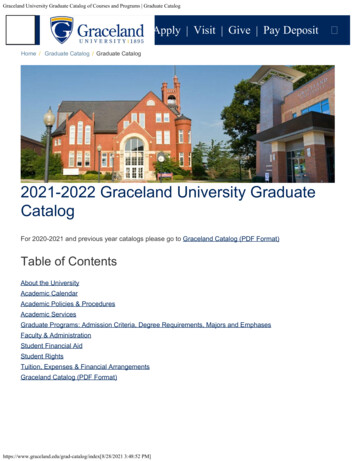
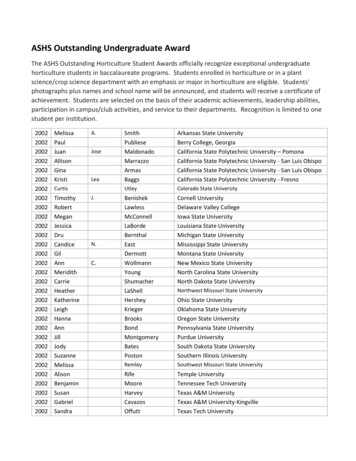

![index [pubdocs.graceland.edu]](/img/16/1213gucatalog.jpg)
